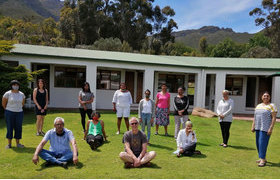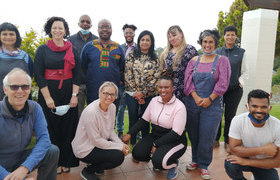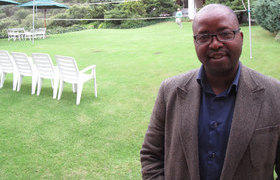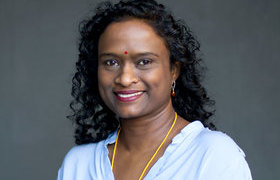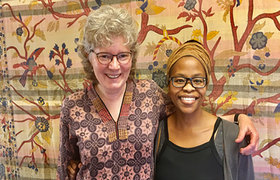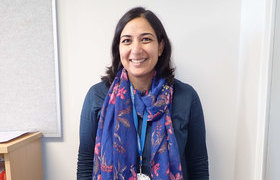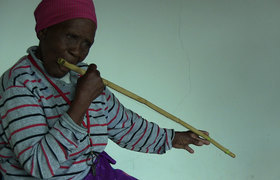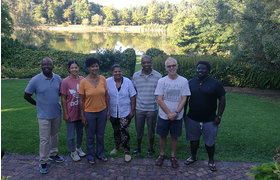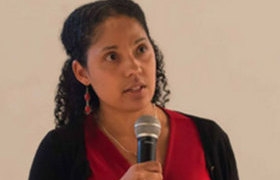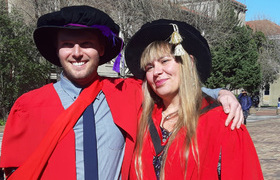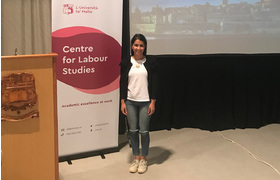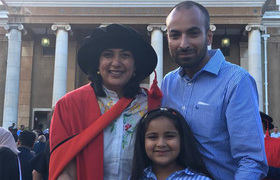Out-of-the-box thinker wins a Premier’s Award
14 March 2019 | Story Niémah Davids. Photo Je’nine May. Read time 6 min.
The year was 1986. South Africa was in a State of Emergency – strikes, mass protests and school boycotts in solidarity with the struggle for liberation were common. Against this turbulent backdrop, a young black woman from Benoni on the East Rand had made the cut to study medicine at the University of Cape Town (UCT), and was on her way to the Mother City.
Dr Mosedi Namane was one of two black students to graduate with an MBChB at UCT in 1990. Fast forward more than three decades and Namane continues to fly the flag high for black women academics and UCT.
In December, Western Cape Premier Helen Zille honoured her with a bronze award for the Best Frontline Public Service Employee in the 2018 Annual Service Excellence Awards. These recognise excellent performances by the province’s public servants who “have gone beyond the call of duty” in their line of work.
“I feel incredibly humbled and privileged to have walked away with this accolade,” said Namane.
“Knowing that my contribution is recognised by my respected colleagues in the field is truly heart-warming.”
“I feel incredibly humbled and privileged to have walked away with this accolade. Knowing that my contribution is recognised by my respected colleagues in the field is truly heart-warming.”
Namane is a senior family physician and clinical head at the Vanguard Community Health Centre in Bonteheuwel, as well as for several smaller surrounding clinics.
As well as stewarding clinical governance, she wears another hat: senior lecturer in Family Medicine at UCT, which includes a solid research and academic component that will benefit her patients in the long-term.
Namane is also a member of UCT’s Next Generation Professoriate (NGP) Programme, launched in 2015. The NGP forms part of the institution’s efforts to transform its academic profile, with a focus on black and women staff.
Together with Sister Sharm Naidoo, Namane is responsible for overseeing UCT’s medical and rehabilitation students who undertake the practical leg of their degrees in the Langa and Bonteheuwel areas. When they are not at the clinics in these communities, they’re at the UCT Learning Centre, an extension of the Vanguard clinic, practising community-based education.
“I need to make sure that everything runs according to plan. I make sure health systems are in place for patients and that students have what they need for in-service learning,” she said.
Spearheading several programmes
To alleviate pressure on the already overburdened Red Cross War Memorial Children’s Hospital, Namane and a team of medical professionals are rolling out an allergy programme at primary healthcare level in the Western Cape. This will ensure that children who suffer from asthma, eczema and common allergies are treated at community facilities by doctors who are proficient in these areas.
Under her guidance, the Vanguard Community Health Centre has already established an allergy clinic for paediatric patients to trial and test the effectiveness of the allergy programme at primary healthcare level.
“Red Cross should be seeing children who are in trouble, like children with burn wounds and a list of other things. Allergies can easily be treated and managed on primary level with very good results. The allergy clinic for paeds at Vanguard proves this,” she said.
Namane has also been an advocate for “no deaths by diarrhoea”, and is leading a programme in her sub-district to significantly reduce the number of children who die as a result of diarrhoea.
“In the past many children died as a result of a runny tummy. We needed a multi-pronged intervention from several stakeholders across all levels of care, and now we have one that’s working,” she said.
“We needed a multi-pronged intervention from several stakeholders across all levels of care, and now we have one that’s working.”
The programme includes awareness campaigns largely driven by community-based workers on the telltale signs of diarrhoea, and what parents and caregivers should do when children are affected.
Namane has been nominated by the head of the Western Cape Department of Health Dr Beth Engelbrecht to serve on the Provincial Pharmacy and Therapeutics Committee, which oversees the pharmaceuticals used at all levels of healthcare.
“I bring the expertise from primary level and I speak on behalf of my peers about the medicine requirements for the well-being of our patients at this level,” she said.
Namane added that community-based healthcare facilities deal with a lot more than just cases of common colds and tonsillitis, mainly because they are the first point of care for communities.
More serious cases like lupus and emphysema come through their doors – and doctors need support systems, which include special medicines to manage the patients locally while they wait for higher-level care options to become available.
The “invaluable” NGP
With so many irons in the fire, having the NGP provide the coaching and perspective Namane needs as an academic has been of immense value, she said. It has also given her a platform from which to focus on her research and to grow as an academic.
“The NGP has been invaluable. It has forced me to think out of the box and beyond what I am currently doing. It’s really nurtured me as an academic and I am honestly grateful.”
In addition, the programme has provided a space for her to express herself and given her the opportunity to learn from others.
“The learning never stops, and through this programme I am able to learn from others outside of my field. That has been most enriching, and I’ll carry it with me for a long time to come,” she said.
 This work is licensed under a Creative Commons Attribution-NoDerivatives 4.0 International License.
This work is licensed under a Creative Commons Attribution-NoDerivatives 4.0 International License.
Please view the republishing articles page for more information.
Next Generation Professoriate (NGP)
The Next Generation Professoriate (NGP) is a mid-career academic staff development and support programme. Funded by the vice-chancellor’s Strategic Funds, the NGP addresses demographic inequalities in the academic hierarchy. The goal is to help members become associate and full professors.
The NGP was officially launched in September 2015. By the end of 2018, four of its members had been promoted to full professor and a further 14 had reached the rank of associate professor.
The programme is led by Dr Robert Morrell, who has over 35 years of academic experience in South African universities. He has a B1-rating from the the National Research Foundation (NRF) and is an elected member of the Academy of Sciences in South Africa.
Newsletters
In the news

